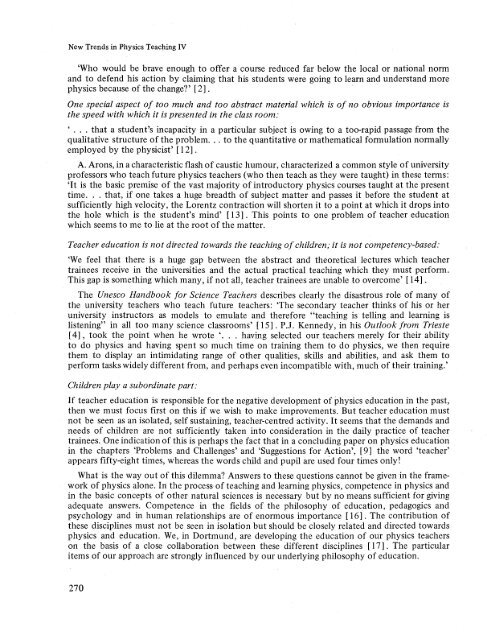New trends in physics teaching, v.4; The ... - unesdoc - Unesco
New trends in physics teaching, v.4; The ... - unesdoc - Unesco
New trends in physics teaching, v.4; The ... - unesdoc - Unesco
You also want an ePaper? Increase the reach of your titles
YUMPU automatically turns print PDFs into web optimized ePapers that Google loves.
<strong>New</strong> Trends <strong>in</strong> Physics Teach<strong>in</strong>g IV<br />
‘Who would be brave enough to offer a course reduced far below the local or national norm<br />
and to defend his action by claim<strong>in</strong>g that his students were go<strong>in</strong>g to learn and understand more<br />
<strong>physics</strong> because of the change?’ [ 21.<br />
One special aspect of too much and too abstract material which is of no obvious importance is<br />
the speed with which it is presented <strong>in</strong> the class room:<br />
‘ . .. that a student’s <strong>in</strong>capacity <strong>in</strong> a particular subject is ow<strong>in</strong>g to a too-rapid passage from the<br />
qualitative structure of the problem. .. to the quantitative or mathematical formulation normally<br />
employed by the physicist’ [ 121 .<br />
A. Arons, <strong>in</strong> a characteristic flash of caustic humour, characterized a common style of university<br />
professors who teach future <strong>physics</strong> teachers (who then teach as they were taught) <strong>in</strong> these terms:<br />
‘It is the basic premise of the vast majority of <strong>in</strong>troductory <strong>physics</strong> courses taught at the present<br />
time. . . that, if one takes a huge breadth of subject matter and passes it before the student at<br />
sufficiently high velocity, the Lorentz contraction wil shorten it to a po<strong>in</strong>t at which it drops <strong>in</strong>to<br />
the hole which is the student’s m<strong>in</strong>d’ [ 131. This po<strong>in</strong>ts to one problem of teacher education<br />
which seems to me to lie at the root of the matter.<br />
Teacher education is not directed towards the teach<strong>in</strong>g of children; it is not competency-based:<br />
‘We feel that there is a huge gap between the abstract and theoretical lectures which teacher<br />
tra<strong>in</strong>ees receive <strong>in</strong> the universities and the actual practical teach<strong>in</strong>g which they must perform.<br />
This gap is someth<strong>in</strong>g which many, if not all, teacher tra<strong>in</strong>ees are unable to overcome’ [ 141 .<br />
<strong>The</strong> <strong>Unesco</strong> Handbook for Science Teachers describes clearly the disastrous role of many of<br />
the university teachers who teach future teachers: ‘<strong>The</strong> secondary teacher th<strong>in</strong>ks of his or her<br />
university <strong>in</strong>structors as models to emulate and therefore “teach<strong>in</strong>g is tell<strong>in</strong>g and learn<strong>in</strong>g is<br />
listen<strong>in</strong>g” <strong>in</strong> all too many science classrooms’ [ 151 . P.J. Kennedy, <strong>in</strong> his Outlook from Trieste<br />
[4], took the po<strong>in</strong>t when he wrote ‘. . . hav<strong>in</strong>g selected our teachers merely for their ability<br />
to do <strong>physics</strong> and hav<strong>in</strong>g spent so much time on tra<strong>in</strong><strong>in</strong>g them to do <strong>physics</strong>, we then require<br />
them to display an <strong>in</strong>timidat<strong>in</strong>g range of other qualities, skills and abilities, and ask them to<br />
perform tasks widely different from, and perhaps even <strong>in</strong>compatible with, much of their tra<strong>in</strong><strong>in</strong>g.’<br />
Children play a subord<strong>in</strong>ate part:<br />
If teacher education is responsible for the negative development of <strong>physics</strong> education <strong>in</strong> the past,<br />
then we must focus first on this if we wish to make improvements. But teacher education must<br />
not be seen as an isolated, self susta<strong>in</strong><strong>in</strong>g, teacher-centred activity. It seems that the demands and<br />
needs of children are not sufficiently taken <strong>in</strong>to consideration <strong>in</strong> the daily practice of teacher<br />
tra<strong>in</strong>ees. One <strong>in</strong>dication of this is perhaps the fact that <strong>in</strong> a conclud<strong>in</strong>g paper on <strong>physics</strong> education<br />
<strong>in</strong> the chapters ‘Problems and Challenges’ and ‘Suggestions for Action’, [9] the word ‘teacher’<br />
appears fifty-eight times, whereas the words child and pupil are used four times only!<br />
What is the way out of this dilemma? Answers to these questions cannot be given <strong>in</strong> the framework<br />
of <strong>physics</strong> alone. In the process of teach<strong>in</strong>g and learn<strong>in</strong>g <strong>physics</strong>, competence <strong>in</strong> <strong>physics</strong> and<br />
<strong>in</strong> the basic concepts of other natural sciences is necessary but by no means sufficient for giv<strong>in</strong>g<br />
adequate answers. Competence <strong>in</strong> the fields of the philosophy of education, pedagogics and<br />
psychology and <strong>in</strong> human relationships are of enormous importance [ 161. <strong>The</strong> contribution of<br />
these discipl<strong>in</strong>es must not be seen <strong>in</strong> isolation but should be closely related and directed towards<br />
<strong>physics</strong> and education. We, <strong>in</strong> Dortmund, are develop<strong>in</strong>g the education of our <strong>physics</strong> teachers<br />
on the basis of a close collaboration between these different discipl<strong>in</strong>es [ 171. <strong>The</strong> particular<br />
items of our approach are strongly <strong>in</strong>fluenced by our underly<strong>in</strong>g philosophy of education.<br />
270
















